|
|
|
Sort Order |
|
|
|
Items / Page
|
|
|
|
|
|
|
| Srl | Item |
| 1 |
ID:
116405


|
|
|
|
|
| Publication |
2012.
|
| Summary/Abstract |
The CHP is the oldest party in Republican Turkey. After transitioning to a multiparty political system, the party has positioned itself in center-left in the 1960s after holding power in the single-party period. The party was closed in 1981 and reopened in 1992, but it has not been in power ever since. It has been the main opposition party since 2002. In the 2011 elections, the party recorded its best result since 1980, with 25.9 percent of the vote. However, this rate did not satisfy CHP sympathizers. In fact, the party has attempted to enlarge its voting base and reinforce its vision and ideology.
|
|
|
|
|
|
|
|
|
|
|
|
|
|
|
|
| 2 |
ID:
116406


|
|
|
|
|
| Publication |
2012.
|
| Summary/Abstract |
This paper elucidates patterns of cooperation over the past three decades between some Islamic and secular organizations in Turkey's human rights movement. This paper argues the human rights master frame provided the building blocks for activists to build bridges among ideologically disparate organizations. As a result, a process of reconciliation blossomed in the mid-1990s during a tumultuous period of unprecedented opportunities and severe repression. In addition to the human rights master frame, which formed an ideational bridge across distinct agendas, organizational leaders served as brokers, battling a culture of mistrust and intolerance through confidence-building measures. Although movement activists have made great strides in reconciling differences, two issues-lesbian, gay, bisexual, transsexual rights and external funding-pose new challenges to cross-cleavage partnerships.
|
|
|
|
|
|
|
|
|
|
|
|
|
|
|
|
| 3 |
ID:
116404
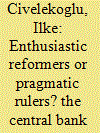

|
|
|
|
|
| Publication |
2012.
|
| Summary/Abstract |
This article examines the underpinnings of central bank (CB) reform in Turkey, with a focus on the role of external anchors, namely the European Union (EU) and the International Monetary Fund. It argues that although international actors played a substantial role in triggering CB reform in 2001, they failed to determine its parameters. The high costs of CB reform in the calculations of the ruling politicians allowed the Central Bank of the Republic of Turkey to gain partial operational autonomy, which fell short of fulfilling the Copenhagen criteria for accession to the EU. This article ends by arguing that due to the duration of high costs, the Bank continues to hold partial autonomy today.
|
|
|
|
|
|
|
|
|
|
|
|
|
|
|
|
| 4 |
ID:
116409
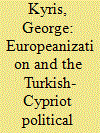

|
|
|
|
|
| Publication |
2012.
|
| Summary/Abstract |
The paper seeks to investigate the European Union (EU) impact on the Turkish-Cypriot (TC) political parties via (a) the TC prospects for EU integration as part of a united Cyprus and (b) the recently commenced Brussels-northern Nicosia interaction. In doing so, the paper engages with the discussion on "Europeanization" and argues that the EU integration has affected TC party competition and its outcome. This process of "Europeanization" is importantly mediated by three specificities of the TC community as a case of contested state: (a) the centrality of the Cyprus problem in the public debate, (b) the limited diplomatic recognition of the self-proclaimed TC administration and (c) the TC international isolation.
|
|
|
|
|
|
|
|
|
|
|
|
|
|
|
|
| 5 |
ID:
116407
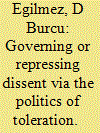

|
|
|
|
|
| Publication |
2012.
|
| Summary/Abstract |
This paper attempts to critically scrutinize the recent policies of Turkey's ruling Justice and Development Party (AKP) in relation to the Turkish working class by means of the liberal concept of toleration. In order to realize this objective, it investigates the links between the theoretical framework of toleration, the AKP policies toward the working class (conceptualized in terms of toleration) and the history of dissent articulated by Turkish workers under the AKP. The five most recent May Day demonstrations (2007-11) constitute the focus of this study as historical moments when this tripartite relationship became most visible. As such, this study discusses the relationship between class difference, toleration and the substitution of the binary value of justice-philanthropy for that of equality.
|
|
|
|
|
|
|
|
|
|
|
|
|
|
|
|
| 6 |
ID:
116412


|
|
|
|
|
| Publication |
2012.
|
| Summary/Abstract |
As the Korean War broke out in 1950, the decision to send a Turkish brigade to Korea was met with almost total acceptance by the Turkish people, although the opposition party criticized the decision-making process for not being legal. Among others, one reason for sending troops was to prove to the Western world the reliability and value of Turkey as a possible NATO member. This article analyzes the coverage of the outbreak and development of the Korean War, the state of the Turkish politics in 1950s, and the discussions surrounding the decision of entering the war in the Turkish press.
|
|
|
|
|
|
|
|
|
|
|
|
|
|
|
|
| 7 |
ID:
116399
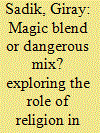

|
|
|
|
|
| Publication |
2012.
|
| Summary/Abstract |
In the aftermath of 9/11, Islam has been put at the heart of heated debates about the role of religion in foreign policy. In the following year of 2002, the election of the Justice and Development Party (AKP) to government has brought new questions to the table about how Turkey can respond to the changes in its transforming environment, and whether Turkey would transform its foreign policy. Considering the moderate Islamist background of the AKP government and its pro-active foreign policy toward Muslim countries, there is a need to explore the processes of how Islam has become an appealing ground for constructing an identity-based Turkish foreign policy. To project if (or how) this transformation is likely to last beyond the AKP, one needs to delineate how Islam interacts with geopolitics when crafting Turkish foreign policy. The article explores this interaction within the context of transforming Turkish foreign policy by benefitting from theoretical insights of constructivism and realism.
|
|
|
|
|
|
|
|
|
|
|
|
|
|
|
|
| 8 |
ID:
116400
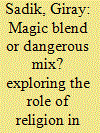

|
|
|
|
|
| Publication |
2012.
|
| Summary/Abstract |
In the aftermath of 9/11, Islam has been put at the heart of heated debates about the role of religion in foreign policy. In the following year of 2002, the election of the Justice and Development Party (AKP) to government has brought new questions to the table about how Turkey can respond to the changes in its transforming environment, and whether Turkey would transform its foreign policy. Considering the moderate Islamist background of the AKP government and its pro-active foreign policy toward Muslim countries, there is a need to explore the processes of how Islam has become an appealing ground for constructing an identity-based Turkish foreign policy. To project if (or how) this transformation is likely to last beyond the AKP, one needs to delineate how Islam interacts with geopolitics when crafting Turkish foreign policy. The article explores this interaction within the context of transforming Turkish foreign policy by benefitting from theoretical insights of constructivism and realism.
|
|
|
|
|
|
|
|
|
|
|
|
|
|
|
|
| 9 |
ID:
116410
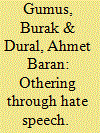

|
|
|
|
|
| Publication |
2012.
|
| Summary/Abstract |
In heated struggles for power like election campaigns, political rivals are villainized through othering in the mass media. This is clearly the case in Turkey where society is structurally polarized along ethnic, religious, regional and political cleavages as well as sociological conflict lines between Islamists and secularists, urban (and Thracian) citizens in coastal cities and rural Anatolian villagers. The anti-Semitist (V)Akit newspaper, which attracts attention with its immoderate, militant, Sunni-Islamist discourse, used negative stereotypes in headlines and news coverage, columns, cartoons and caricatures. The daily tried to villainize its secularist rivals like Thracians and Kemalists by using inflammatory, abusive words and defamatory allegations.
|
|
|
|
|
|
|
|
|
|
|
|
|
|
|
|
| 10 |
ID:
116413
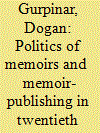

|
|
|
|
|
| Publication |
2012.
|
| Summary/Abstract |
Rather than investigating memoirs as sources for writing history, this article attempts to discuss the political and ideological meanings attributed to memoirs and how the memoir-publishing industry was utilized for such dispositions and proclivities in twentieth century Turkey. The article also examines how different social, ideological, and cultural milieus and circles were interested and fascinated with autobiographical writings and memoirs. The article concludes with examining how memoirs subsequently became a contested area and perceived as assets and instruments to be employed against political and ideological opponents with the booming interest in memoirs publishing that began in the 1990s.
|
|
|
|
|
|
|
|
|
|
|
|
|
|
|
|
| 11 |
ID:
116408
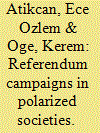

|
|
|
|
|
| Publication |
2012.
|
| Summary/Abstract |
Can referendum mechanism be used in deeply polarized societies without invoking existing cleavages? This question is tackled by studying two recent Turkish constitutional referenda, which took place in 2007 and 2010. Turkish society and politics are highly polarized along the secular versus pro-Islam axis. Based on an in-depth study of the campaign materials, media content analysis, and survey data from both cases, it is demonstrated that although both referendum proposals were related to secularism in Turkey, this cleavage was more visible in the 2010 vote. If political parties choose to treat referenda as elections, voters' predispositions are more likely to be reinforced, and partisan voting is more likely to prevail. This research shows that controlled comparisons help in understanding the role of party politics in direct democracy.
|
|
|
|
|
|
|
|
|
|
|
|
|
|
|
|
| 12 |
ID:
116402
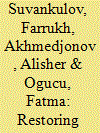

|
|
|
|
|
| Publication |
2012.
|
| Summary/Abstract |
Turkey's economic ties with neighboring Arab countries have flourished in the past few years. A recently stated pledge to create a regional trade alliance with Turkey, Syria, Lebanon and Jordan is likely to trigger a further expansion of economic integration. This paper starts by reviewing trends in Turkey's bilateral trade relations with Syria, Lebanon and Jordan since 2000. Next, it estimates a formal gravity model aiming to project Turkey's trade potential with its neighbors and compare them with the actual flows in 2000-10. It is demonstrated that while Turkey fully realized its bilateral trade potential vis-à-vis Syria, Lebanon and Jordan, actual bilateral trade of Syria, Lebanon and Jordan with Turkey is significantly below the estimated potential.
|
|
|
|
|
|
|
|
|
|
|
|
|
|
|
|
| 13 |
ID:
116403


|
|
|
|
|
| Publication |
2012.
|
| Summary/Abstract |
This article provides an analytical discussion on the rise of political Islam in Turkey by examining the rise of the Islamic Welfare Party in the 1990s. The study, utilizing a historic analysis, reveals that the Islamic opposition in Turkey is both a reaction to Kemalist reforms and to undesirable local conditions, especially, economic distress, unjust distribution of national wealth, corruption, and perceived lack of freedom. Certain structural conditions aiding the Welfare Party to increase its power are also discussed. Many lessons learned in terms of managing the Islamic challenge and implications with respect to the prospect are addressed at the end.
|
|
|
|
|
|
|
|
|
|
|
|
|
|
|
|
| 14 |
ID:
116411
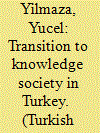

|
|
|
|
|
| Publication |
2012.
|
| Summary/Abstract |
The purposes of this study are to evaluate the phase Turkey is in with regard to the transition to a knowledge society and to discuss the priorities in relation to this process in the future. In this task, first, the concept of knowledge society is examined according to various views along with the properties that such a sociological structure needs to have. Then, the current state of Turkey is assessed. This is carried out on the basis of different studies published by International Telecommunication Union, United Nations, and Turkish State Planning Organization. In the last section, it is discussed how the transition process to a knowledge society in Turkey can be managed in a more effective and efficient way. This study points out that in Turkey important improvements especially with regard to infrastructure and education have to be achieved.
|
|
|
|
|
|
|
|
|
|
|
|
|
|
|
|
| 15 |
ID:
116401
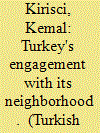

|
|
|
|
|
| Publication |
2012.
|
| Summary/Abstract |
This article argues that a synthetic look at different dimensions of Turkey's engagement of its neighborhood, be it movement of people, civil society interactions and economic exchanges, offers a better understanding of both the broader context within which Turkey's foreign policy is changing and the precise modalities through which this transformation is taking place. This engagement offers a range of opportunities from assisting neighboring countries, including the Arab world, to reform and modernize economically as well as politically to nudging the neighborhood to seek greater interdependence, dialog and cooperation. This would be promising in terms of "win-win" outcomes for Turkey, the European Union (EU) and the region. Such an interdependent and integrated neighborhood around Turkey could unleash economic, social and political processes that may eventually lead to a "democratic peace" in the region even if it might be in the very distant future. However, a number of tough challenges from reinvigorating democratization in Turkey and revitalizing EU-Turkish relations to stubborn regional conflicts would have to be addressed. Governments as well as civil society, academia and the think-tank world ought to start to think about what to do with these challenges.
|
|
|
|
|
|
|
|
|
|
|
|
|
|
|
|
|
|
|
|
|